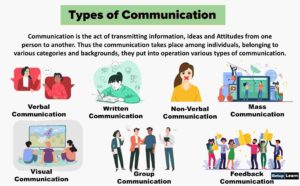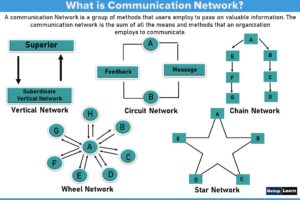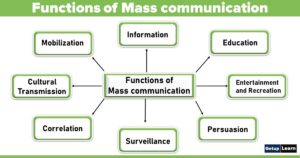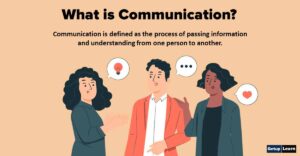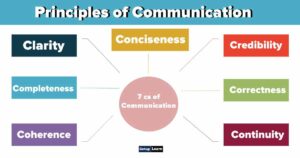Table of Contents
- 1 What is Group Communication?
-
2 Importance of Group Communication
- 2.1 Making Sense and Sharing that Sense with Others
- 2.2 Creating Meaning
- 2.3 Includes Verbal and Nonverbal Messages
- 2.4 Generation of Effective Group Outcomes
- 2.5 Feeling a Sense of Belonging
- 2.6 Role of Group Leader
- 2.7 Obtaining Support and Assistance from Others
- 2.8 Formulation of Clear and Well-defined Roles
- 2.9 Implementing Collaborative Strategies
- 2.10 Achieving Standards of Excellence
- 3 Characteristics of Group Communication
- 4 Advantages of Group Communication
- 5 Disadvantages of Group Communication
-
6 FAQ Related to Group Communication
- 6.1 What is the meaning of group communication?
- 6.2 What is the definition of group communication?
- 6.3 What is the importance of group communication?
- 6.4 What are the characteristics of group communication?
- 6.5 What are the advantages of group communication?
- 6.6 What are the disadvantages of group communication?
What is Group Communication?
Group communication can be defined as “an interactive process that occurs among three or more people interacting in an attempt to achieve commonly recognized goals either face-to-face or through mediated forms.” A group is a collection of people with specific goals or objectives. Cohesion is an important factor in groups.
Group communication is less for interaction only. It is specifically meant for problem-solving. So goal orientation is another important factor of group communication.

In this type of communication, the members of a group interact with each other. A group is a collectivity of people who have common interests. Discussions in a workshop, a seminar, or a family are examples of group communication.
Group communication is used to take a collective decision on a problem, an issue, or a matter of common concern. The participants involved in group communication take an active part in communication to achieve a set of goals, develop social contacts, or find the solution to a problem faced by the group.
Read Also: What is Group Discussion?
Importance of Group Communication
These are some importance of group communication that are explained below:
- Making Sense and Sharing that Sense with Others
- Creating Meaning
- Includes Verbal and Nonverbal Messages
- Generation of Effective Group Outcomes
- Feeling a Sense of Belonging
- Role of Group Leader
- Obtaining Support and Assistance from Others
- Formulation of Clear and Well-defined Roles
- Implementing Collaborative Strategies
- Achieving Standards of Excellence
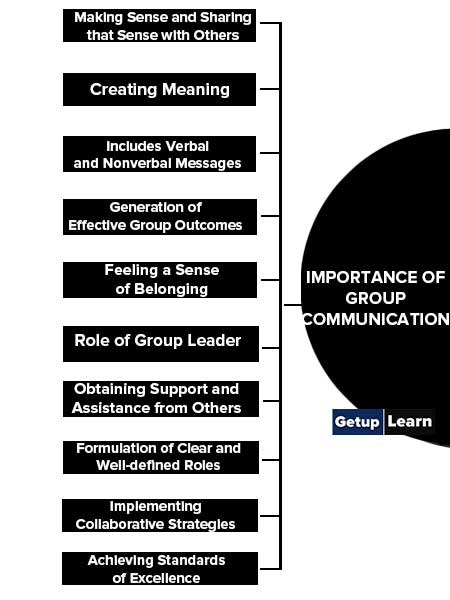
Making Sense and Sharing that Sense with Others
Within organizations when individuals are working in groups, they have an aim to achieve. Their major aim is to facilitate the communication processes in such a manner that they are able to enhance their knowledge and share that knowledge with others.
For instance, supervisors may get engaged in group communication with employers. In the communication processes, they acquire knowledge in terms of carrying out the job duties satisfactorily and how to enable the workforce to implement the job duties well.
They share this knowledge with the workforce. Hence, it needs to be ensured that group communication makes sense and that sense needs to be shared with others. Hence, the meaning and significance of group communication are acknowledged when it is sensible and members are able to understand the information.
Creating Meaning
When the members of the organization are working on projects and are required to work in collaboration and integration with other people, they need to focus on ensuring that the communication processes are meaningful. When one speaks, he or she is required to think before speaking, and when one puts forward questions, one needs to ensure that questions are intellectual and meaningful.
When the individuals themselves are not aware of the answers, they need to put forward questions. Meaning is created within the minds of the senders as well as the receivers of information. The meaning of the information is not sent but created. When one has created the meaning of the information, only then do they need to impart it.
Hence, creating meaning also renders a significant contribution to facilitating the understanding of the meaning and importance of group communication.
Includes Verbal and Nonverbal Messages
In group communication, individuals communicate with each other through verbal and nonverbal messages. When these are made use of in communicating, it needs to be ensured, that they are meaningful and make sense. A symbol is something that represents a thought, subject, idea, or concept.
Verbal communication is put into operation to a major extent. As it is the common means through which communication takes place among individuals. On the other hand, the communication that takes place through nonverbal messages is through the use of gestures, postures, tone of voice, and body language.
These communicate emotions and also individuals are able to express, whether they are motivated towards the accomplishment of tasks and activities or not. Hence, communication through verbal and nonverbal messages is regarded as vital in understanding the meaning and importance of group communication.
Generation of Effective Group Outcomes
As it has been understood that individuals are communicating with each other in groups when they need to work in coordination with others to generate the desired outcomes. When individuals are working on projects or other assignments and need to work in groups, they need to ensure, that they communicate effectively with all the group members.
All the members have various job duties to perform. They are assigned the job duties in accordance with their educational qualifications, competencies, and abilities. Apart from carrying out their job duties, they need to pay attention to the implementation of communication processes in an effective manner.
Hence, when the members of the groups are dedicated to the achievement of effective group outcomes, they are able to understand the meaning and importance of group communication.
Feeling a Sense of Belonging
When individuals are working in a group, they need to possess a sense of belonging. In accordance with the research studies on group communication, when individuals are working in a group, they need to form amiable and pleasant terms and relationships with others.
When someone is giving ideas or suggestions or identifying errors, it is necessary for the group members to listen and make corrections. Possession and implementation of effective listening skills are regarded to be of utmost significance in putting into operation the tasks and activities in a well-organized manner and in generating the desired outcomes.
Hence, it can be stated, that feeling a sense of belonging is regarded as one of the indispensable factors that facilitate the understanding of the meaning and importance of group communication.
Role of Group Leader
Within groups, there is a group leader, who is vested with the authority and responsibility of ensuring that the other members of the group are performing their job duties in accordance with the desired expectations. The group leaders are required to evaluate the job performance of the group members.
When they put into operation the methods and approaches to evaluate the job performance of the group members, they need to communicate with them in terms of feedback. When the feedback is constructive, the members feel contented.
On the other hand, when the feedback is not constructive, the members need to bring about improvements. Hence, when individuals are performing the job duties of group leaders, they are required to communicate well with other group members and acquire an efficient understanding of the meaning and importance of group communication.
Obtaining Support and Assistance from Others
When individuals are working in groups, they are able to obtain support and assistance from others in the achievement of desired goals and objectives. In the present existence, traditional methods have been replaced by modern, technical, and innovative methods.
Normally, the members are well-aware in terms of the implementation of modern, technical, and pioneering methods, but it is essential for them to obtain support and assistance from others as well. Discussing with others and exchanging ideas and perspectives are regarded to be of utmost significance in the achievement of desired goals and objectives.
Hence, the group members need to form the viewpoint that through effective group communication, they are able to receive support and assistance, are able carry out their job duties in a well-organized manner and understand the meaning and importance of group communication.
Formulation of Clear and Well-defined Roles
In group communication, the individuals are able to formulate clear and well-defined roles. Goals and objectives are clear, specific, and measurable. In some cases, when the individuals are working solely, they are not well aware in terms of goals and objectives.
But when the individuals are working in groups, they are well aware of goals and objectives to achieve. In accordance with the research studies, individuals are normally experiencing problems, when they are required to work on research projects solely.
In order to provide solutions to problems, they need to obtain support and assistance from supervisors. But when they are working in groups, they obtain support and assistance from others as well as formulate clear and well-defined roles. Hence, the formulation of clear and well-defined roles enables the group members to understand the meaning and importance of group communication.
Implementing Collaborative Strategies
In order to work in collaboration and integration with each other, the individuals need to implement collaborative strategies. Collaborative strategies are regarded to be the essence of group communication. Collaborative strategies are the strategies that are aimed to facilitate collaboration and integration among the members of the organization and groups in an efficient manner.
One of the most useful and meaningful collaborative strategies is effective communication. Apart from effective communication, the members need to possess an approachable nature and amiable attitude, depict helpfulness and cooperation, implement time management skills, and need to ensure that there are not any occurrences of conflicting situations and disagreements.
Hence, it can be stated, that when the members are well-aware in terms of collaborative strategies, they are contributing effectively in working well with the group members as well as in understanding the meaning and importance of group communication.
Achieving Standards of Excellence
A group is more likely to achieve its potential if it establishes high standards and believes that goals and objectives can be achieved. This is comprehensively understood that when the members of the organization are working in groups or they are carrying out various tasks and functions on an individual basis, they need to achieve the standards of excellence.
In order to achieve the standards of excellence, apart from the possession of knowledge and competencies, they need to implement effective communication skills.
Effective communication with the group members as well as the members of the organization is regarded as a key aspect in achieving the desired goals and in enriching the overall structure of the organization. Hence, it can be stated, that achieving standards of excellence enables individuals to understand the meaning and importance of group communication.
Read Also: Features of Group Discussion
Characteristics of Group Communication
Following are the characteristics of group communication:
- Experience
- Problem-Solving Skills
- Time Management Skills
- Conflict Resolution Skills
- Openness
- Supportiveness
- Achievement-oriented
- Cooperation and Helpfulness
- Adjusting
- Possession of Constructive View Points
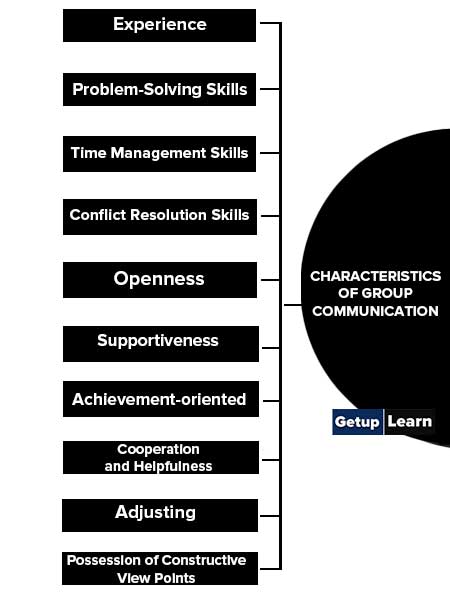
Experience
When individuals are working on certain assignments or projects, it is vital for them to possess experience, particularly in terms of methods and procedures. Efficient group members possess practical experience in providing solutions to various types of problems and challenges that may arise as well as in the effective implementation of job duties.
Experience is regarded to be of utmost significance. Hence, when individuals get recruited within organizations, possession of job experience is regarded as the fundamental requirement. Hence, experience is regarded as one of the indispensable characteristics of the members of the group.
Problem-Solving Skills
Problem-solving skills are the skills, which that individuals need to possess in providing solutions to a particular problem or problems. The ability to possess problem-solving skills enables individuals to overcome the barriers that may arise within the course of implementation of job duties and achievement of goals and objectives.
Apart from overcoming barriers, the effective implementation of problem-solving skills also enables individuals to provide solutions to work-related problems as well. Hence, it is crucial for the group members to possess the problem-solving skills, needed in performing well in their job duties and in the achievement of desired goals and objectives.
Time Management Skills
Time management skills are the skills that enable individuals to assign priorities to tasks and activities. When individuals are overwhelmed by the number of tasks and functions, they carry out those tasks first, which are more important, whereas the tasks, which are less important are procrastinated.
When individuals are working in groups, then also it is vital for them to implement time management skills, so they are able to carry out tasks and activities in an appropriate manner. Hence, the implementation of time management skills is also regarded as an important characteristic that needs to be possessed by group members.
Conflict Resolution Skills
It is possible that in some cases, the group members may likely get engaged in conflicting situations or disagree with each other in terms of various issues. But in order to gain success in the achievement of group goals, they need to put into operation conflict resolution skills in a peaceful manner.
One of the effective conflict resolution skills is communicating in a polite and decent manner and implementing listening skills. The members need to be well aware of conflict resolution skills. Hence, the implementation of conflict resolution skills is regarded as an important characteristic that needs to be possessed by group members.
Openness
Openness is regarded as a characteristic of group members that is of utmost significance. When the members of the group possess this characteristic, they are able to express their viewpoints and perspectives freely and overcome apprehensiveness and vulnerability.
The group leaders need to make provisions for equal rights and opportunities for all the members of the group to express their ideas and viewpoints. Furthermore, openness illustrates that the members of the group are open to the viewpoints and perspectives expressed by others. Hence, openness is an important characteristic that needs to be possessed by group members.
Supportiveness
This is comprehensively understood that members of the group need to be supportive of each other. When the members of the group possess this characteristic, they give as well as obtain help and assistance that is necessary for carrying out their job duties in a well-organized manner.
Inculcating the characteristic of supportiveness enables individuals to acquire appreciation. The members need to pay attention to the up-gradation of this characteristic on a continuous basis, throughout their job duties within groups as well as the organization as a whole. Hence, it can be stated, that supportiveness is an important characteristic that needs to be possessed by group members.
Achievement-oriented
The members of the group need to be achievement-oriented. The characteristic of achievement-oriented is regarded as significant in the development of motivation, interest, and enthusiasm. Hence, the members need to pay attention to it on regular basis.
Furthermore, this characteristic implies that they need to put into operation the methods and strategies that would be productive and worthwhile in the achievement of desired goals.
Getting engaged in effective communication is regarded as one of the indispensable ways of performing one’s job duties in a well-organized manner and in generating the desired outcomes. Hence, the characteristic of being achievement-oriented is important for the group members.
Cooperation and Helpfulness
Possessing a cooperative attitude and a helping nature enables individuals to maintain amiable and cordial terms and relationships with each other. It is apparent that within groups as well as within organizations, one cannot work in seclusion.
The individuals need to work in coordination with each other and depict cooperative and helpful nature. These characteristics are not only regarded as crucial in generating the desired outcomes, but also in acquiring promotional opportunities and enhancing one’s status within a group as well as the organization as a whole. Hence, the characteristics of co-operation and helpfulness are important for the group members to acknowledge.
Adjusting
The members of the group need to pay attention to adjusting to others. The group members need to adjust to other individuals, belonging to various castes, creeds, races, religions, ethnicities, cultures, age groups, and socio-economic backgrounds.
They need to learn to accept these factors and not discriminate against each other. There should not be a prevalence of negative viewpoints in terms of any of these factors. In the effective implementation of tasks and activities, individuals need to make provision equal rights and opportunities for others. Hence, the characteristic of adjusting with other members is regarded to be of utmost significance to be possessed by the group members.
Possession of Constructive View Points
The members of the groups are usually overwhelmed and feel work pressure, particularly when they are required to carry out lengthy, time-consuming, and tedious job duties. In such cases, they need to possess constructive viewpoints and should not possess any ill feelings against anybody or any work duty.
The possession of constructive viewpoints is regarded as indispensable in carrying out one’s job duties satisfactorily, generating the desired outcomes, and enhancing one’s career prospects. Hence, it is comprehensively understood that the possession of constructive viewpoints is an important characteristic that needs to be possessed by the group members.
Read Also: Characteristics of Group Discussion
Advantages of Group Communication
Let’s discussed now some important advantages of group communication:
- Enhance of Knowledge
- Improvement in Memory
- Stimulating Creativity
- Making Productive Decisions
- Gaining Better Understanding of Oneself

Enhance of Knowledge
When individuals are working in groups, they are able to enhance their knowledge, skills, and abilities. It is apparent that individuals conduct research on a regular basis to enhance their knowledge through technologies, the internet, books, and other reading materials. Apart from making use of technologies and materials, communicating with others will render a significant contribution to enhancing knowledge.
Enhancement of knowledge needs to be focused upon on regular basis. In some cases, one may not be able to understand the concepts well through reading as they are able to understand through communicating with others. Hence, group communication is regarded as important in leading to the enhancement of knowledge.
Improvement in Memory
When individuals communicate with each other verbally, they are able to not only acquire an efficient understanding of the information, but they are able to remember it even in the long-term period. When the information is significant and the individuals are able to remember it even in the long-term, they are able to benefit in the implementation of tasks and activities.
Hence, it can be stated that one of the major advantages of group communication is, that it leads to improvement in memory. Due to this advantage, the group leaders give instructions in a verbal manner, so the members of the group are able to understand and remember.
Stimulating Creativity
Creative ideas are the result of the dedication and efforts that are implemented by the group members. When the members of the organization are working in groups, they need to inculcate the traits of diligence, resourcefulness, and conscientiousness.
Furthermore, they need to ensure that the implementation of creative ideas will render a significant contribution to the achievement of desired goals and objectives. When individuals work in collaboration and integration, they are able to stimulate creativity. The members of the group need to work efficiently towards stimulating creativity. Hence, it is regarded as one of the advantages of group communication.
Making Productive Decisions
Within the course of the implementation of group projects, the individuals need to make decisions as well. In making productive decisions, it is vital for the members to obtain ideas and suggestions from others. When the members of the group express their viewpoints and perspectives and contribute effectively to making productive decisions.
They realize that it is advantageous for them to work in groups and establish effective communication terms with other members. When the decisions are productive, they are beneficial to the organization as a whole. Hence, it can be stated, that making productive decisions is regarded as one of the significant advantages of group communication.
Gaining Better Understanding of Oneself
It is necessary for all the members of the organizations to identify their strengths and weaknesses. When they have adequately identified the strengths and weaknesses, measures need to be formulated to bring about improvements in strengths and eliminate weaknesses.
When individuals are working in groups, they are able to gain a better understanding of themselves and identify their strengths and weaknesses. In group projects, all the members aim to contribute to their best abilities and overcome limitations.
They work towards enhancing their skills and abilities on a continuous basis. Hence, one of the advantages of group communication is, that it enables individuals to gain a better understanding of themselves.
Disadvantages of Group Communication
Following are the disadvantages of group communication:
- Putting Pressure on Others
- Dominating the Discussion
- Increase in Dependence on Other Group Members
- Time Consuming
- Occurrence of Disputes and Disagreements
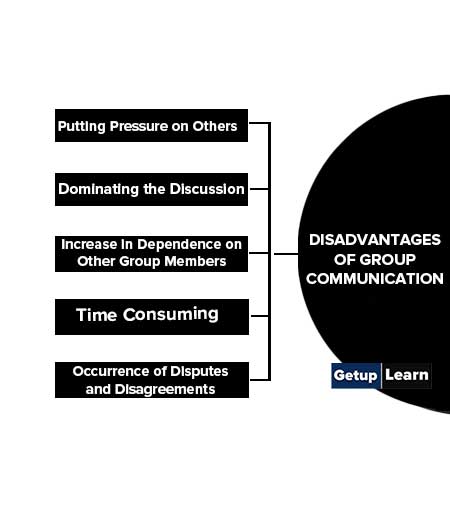
Putting Pressure on Others
The members of the group experience stress in their lives without putting pressure on themselves (Scott, 2019). When an individual is working in groups in some cases, they tend to put more pressure on others regarding job duties and tend to alleviate their own job duties.
When they are questioned, they make an attempt to give valid reasons, which may not sound valid. When they put pressure on others, in some cases, it leads to the occurrence of conflicting situations as well. Conflicting situations are unhealthy for the group as well as for the overall functioning of the organization. Hence, it can be stated, that putting pressure on others is one of the major disadvantages of group communication.
Dominating the Discussion
When the individuals are assigned the roles of group leaders, they tend to dominate the discussion. Dominating the discussion is referred to as assuming the major role in carrying out discussions. When the group leaders dominate the discussion, they ensure that the group members follow their instructions and carry out their job duties in accordance with their guidance.
In some cases, the other members of the group are not able to express their ideas and suggestions. Furthermore, in some cases, they are satisfied with the ideas and suggestions of group leaders, whereas, in other cases, they are not satisfied. Hence, it can be stated, that dominating the discussion is one of the major disadvantages of group communication.
Increase in Dependence on Other Group Members
When the members are newly recruited and are not much experienced in terms of job duties, they tend to be dependent upon the other group members to a major extent. When they are assigned certain job duties, they tend to communicate with other members to seek support and assistance.
In some cases, the increase in dependence is frustrating as it impedes the concentration of other members on their job duties. In some cases, it gives rise to unhealthy terms and relationships among group members. Hence, it can be stated, that an increase in dependence on other group members is one of the crucial disadvantages of group communication.
Time Consuming
When individuals are working in groups, the implementation of tasks and activities can be time-consuming as compared to the tasks, which the individuals may put into operation on an individual basis. The time-consuming procedure does not result in coherence.
In some cases, the group members may carry out their job duties in less amount of time and prevent delay. Whereas, in other cases, the individuals tend to procrastinate their job duties. But on the whole, working as well as discussing and communicating in groups is time-consuming and it is one of the major disadvantages of group communication.
Occurrence of Disputes and Disagreements
In some cases, disputes and disagreements are likely to take place among the members of the group. There are a number of causes due to which disputes and disagreements take place. Some of these include delay in completion of tasks and activities, inability to understand the concepts and procedures, lack of competencies and abilities, lack of effective communication skills, unavailability of resources, and so forth.
When there is the occurrence of disputes and disagreements due to one or more of these factors, the members need to develop mutual understanding to resolve them in order to achieve group goals. Hence, it can be stated, that the occurrence of disputes and disagreements are regarded as major limitations of group communication.
Read Also: Group Discussion Problems
Read More Related Articles
[su_spoiler title=”What is Communication? | Mass Communication” style=”fancy” icon=”plus-circle”]
What is Communication?
[/su_spoiler]
[su_spoiler title=”Types of Communication | Principles of Communication” style=”fancy” icon=”plus-circle”]
-
Types of Communication
- Verbal Communication
- Non-Verbal Communication
- Written Communication
- Visual Communication
- Feedback Communication
- Mass Communication
- Group Communication
[/su_spoiler]
[su_spoiler title=”Nonverbal Communication | Verbal Communication” style=”fancy” icon=”plus-circle”]
[/su_spoiler]
[su_spoiler title=”Written Communication | Oral Communication” style=”fancy” icon=”plus-circle”]
Written Communication
[/su_spoiler]
[su_spoiler title=”Business Communication | Organizational Communication” style=”fancy” icon=”plus-circle”]
[/su_spoiler]
[su_spoiler title=”Formal Communication | Informal Communication” style=”fancy” icon=”plus-circle”]
[/su_spoiler]
[su_spoiler title=”Interpersonal Communication | Informal Communication” style=”fancy” icon=”plus-circle”]
[/su_spoiler]
[su_spoiler title=”Downward Communication | Upward Communication” style=”fancy” icon=”plus-circle”]
[/su_spoiler]
[su_spoiler title=”Barriers to Communication | Horizontal or Lateral Communication” style=”fancy” icon=”plus-circle”]
[/su_spoiler]
[su_spoiler title=”Self Development | Effective Communication” style=”fancy” icon=”plus-circle”]
[/su_spoiler]
[su_spoiler title=”Difference Between Oral and Written Communication | Theories of Communication” style=”fancy” icon=”plus-circle”]
[/su_spoiler]
What is the meaning of group communication?
Group Communication Communication by many persons in a face-to-face situation is described as group communication. Here, as the group grows in size communication tends to become more and more of a monologue reducing participation. The degree of directness, therefore, depends on the size of the group, the place where it meets, and also the relationship of the members of the group to one another. In a group, communication feedback is more difficult to measure and respond to.
What is the definition of group communication?
A group is a collection of users sharing some common interest. Group-based activities are steadily increasing. In other words, Group communication can be among small or large groups, like an organization, club, or classroom, in which all individuals retain their individual identities.
What is the importance of group communication?
The importance of Group Communication is given below:
1. Making Sense and Sharing that Sense with Others
2. Creating Meaning
3. Includes Verbal and Nonverbal Messages
4. Generation of Effective Group Outcomes
5. Feeling a Sense of Belonging
6. Role of Group Leader
7. Obtaining Support and Assistance from Others
8. Formulation of Clear and Well-defined Roles
9. Implementing Collaborative Strategies
10. Achieving Standards of Excellence.
What are the characteristics of group communication?
Characteristics of Group Communication are given below:
1. Experience
2. Problem-Solving Skills
3. Time Management Skills
4. Conflict Resolution Skills
5. Openness
6. Supportiveness
7. Achievement-oriented
8. Cooperation and Helpfulness
9. Adjusting
10. Possession of Constructive View Points.
What are the advantages of group communication?
These are the advantages of group communication:
1. Enhance Knowledge
2. Improvement in Memory
3. Stimulating Creativity
4. Making Productive Decisions
5. Gaining a Better Understanding of Oneself.
What are the disadvantages of group communication?
These are disadvantages of group communication:
1. Putting Pressure on Others
2. Dominating the Discussion
3. Increase in Dependence on Other Group Members
4. Time-Consuming
5. Occurrence of Disputes and Disagreements.


